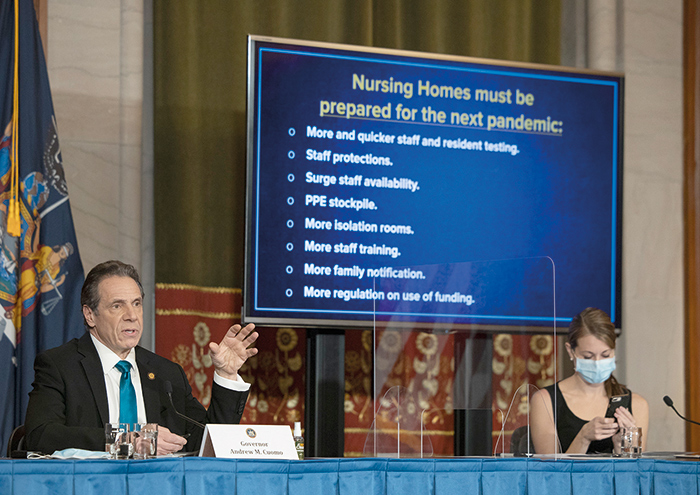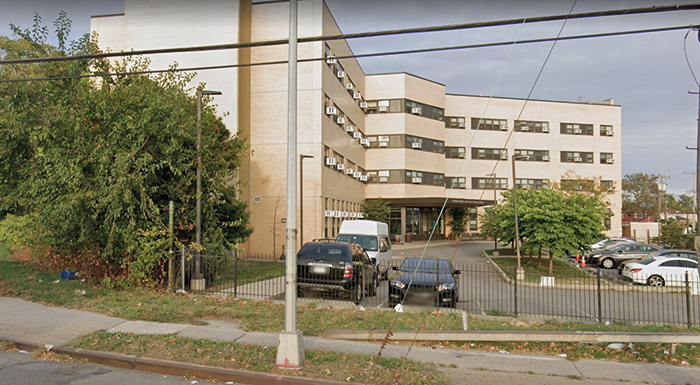Photo Courtesy of Google
Catholic Charities Home for Seniors in Howard Beach
By Michael V. Cusenza
Amid a throbbing COVID scandal rife with investigations seemingly at all levels, Gov. Andrew Cuomo and the Democratic Majority in the State Senate recently advanced packages of legislation to address oversight and care in New York’s nursing facilities.
On Monday, the Senate Democratic Majority announced that its package will establish a direct patient care spending ratio for nursing homes, create a taskforce to reimagine the delivery of long-term care, allow personal and compassionate care visitors, mandate disclosure of nursing home ratings, and require more infection control policies by nursing homes and require state health officials to conduct more thorough inspections.
“The tragic situation in our nursing homes remains a heartbreaking reminder of the toll this pandemic has taken and has made it clear that real reforms are needed,” Senate Majority Leader Andrea Stewart-Cousins said. “The Senate Majority is taking action to deliver meaningful results by increasing transparency and raising the standard of care provided at these facilities. I commend the bill sponsors for their work, and I am proud that we are passing these reforms.”
The legislation being passed by the Senate includes:
Patient Care Ratio Reporting: This bill, S.4336A sponsored by Senator Gustavo Rivera, directs the Commissioner of Health to establish a “Direct Patient Care Ratio” that would require all nursing homes to spend at least 70% of a facility’s revenue on direct patient care.
Publication of Nursing Home Ratings: This bill, S.553 sponsored by Senator James Sanders Jr., requires that the most recent Center for Medicare and Medicaid Services (CMS) rating of every nursing home be prominently displayed on the home page of the Department of Health’s website and at each nursing home facility’s website and displayed at the facility for view by the general public.
Reimagining Long-Term Care Task Force: This bill, S.598B sponsored by Senator Rachel May, enacts the “Reimagining Long-Term Care Task Force” to create a task force studying the state of both home-based and facility-based long-term care services in the state, and to make recommendations on potential models of improvement to long-term care services for older New Yorkers.
Long-Term Care Ombudsman Program Reform Act: This bill, S.612A sponsored by Senator Rachel May, creates “The Long-term Care Ombudsman Program Reform Act” by expanding the current program to be more accessible and available to seniors and their families, while promoting the volunteer advocate program, and improve interactions between DOH and the Ombudsman program regarding complaints.

Photo Courtesy of Mike Groll/Office of the Governor
“These facilities must be transparent and we have to have the tools necessary for holding bad actors accountable—that is the only way families will have peace of mind and I won’t sign a budget that doesn’t include these common-sense reforms,” Gov. Cuomo said.
Allowing Compassionate Care-Giving Visitors: This bill, S.614B sponsored by Senator Rachel May, creates a standardized program to allow personal care and compassionate care visitors at nursing homes.
Infection Inspection Audit: This bill, S.1783 sponsored by Senator James Skoufis, directs the Department of Health to establish and implement an infection control inspection audit and checklist for residential care facilities.
Quality Assurance Committees: This bill, S.1784A sponsored by Senator James Skoufis, requires adult care facilities to include “quality assurance committees” in their quality assurance plans
Requirements for Transfer, Discharge and Voluntary Discharge: This bill, S.3058 sponsored by Senator Gustavo Rivera, creates requirements for the transfer, discharge and voluntary discharge of residents from residential healthcare facilities
Standards for Ownership of Nursing Homes: This bill, S.4893 sponsored by Senator Gustavo Rivera, requires more review of ownership of nursing homes through the certificate of need process – including consideration of past violations at other facilities by owners – and requires more notice to the public during the CON process.
Department of Health Death Records: This bill, S.3061A sponsored by Senator Gustavo Rivera, requires the Department of Health to record COVID-19 deaths of nursing home residents that died in hospitals to be recorded as a “nursing home” death and require the Department of Health to update and share data it receives with hospitals and nursing homes on communicable diseases.
Transparency of Violations: This bill, S.3185 sponsored by Senator James Skoufis, requires residential health care facilities to disclose in writing to potential residents and their family members the website where a list of violations and other actions taken against the facility can be found.
On Friday, Cuomo announced sweeping nursing home reform legislation to increase transparency, hold nursing home operators accountable for misconduct and help ensure facilities are prioritizing patient care over profits as part of the 30-day amendments.
“Every day, families across the state entrust the safety and health of their loved ones to nursing homes and as this unprecedented public health crisis has shown, some performed admirably, but some did not,” Cuomo said. “Facilities have put profits over care for far too long and as we look forward, we must learn from the past and prepare for the future. These facilities must be transparent and we have to have the tools necessary for holding bad actors accountable—that is the only way families will have peace of mind and I won’t sign a budget that doesn’t include these common-sense reforms.”
This legislation aims to improve the safety and quality of New York’s nursing homes through a series of reforms that increase transparency around nursing home staffing, expenditures and ownership; hold operators accountable for violations of the Public Health Law and other misconduct; and ensure nursing home facilities are prioritizing patient care and safety over profits and adequate funding is spent on direct patient care and resident staffing.
Increasing Transparency
Requiring nursing homes to post their rates for each payer source on a public website, updated annually;
Requiring the posting of all facility owners;
Requiring the posting of a list of all contracts or other agreements entered into for provision of goods or services for which any portion of Medicaid or Medicare funds are used by the facility within 30 days of execution of the agreement; and
Requiring information regarding staff be included in an application to establish a nursing home.
Holding Operators Accountable for Misconduct
Increasing civil monetary penalties to $25,000 for violations of the Public Health Law, including increasing penalties for willful violations of Public Health Law or regulation;
Removing the requirement to provide adult care facilities a 30-day period to rectify violations prior to imposition of a penalty; and
Building off legislation signed by the Governor in 2019, requiring any nursing home with a repeat Infection Control Deficiency to work with the Quality Improvement Organization, or a state designated independent quality monitor, at the nursing home’s own expense, to assess and resolve the facility’s infection control deficiencies.
Streamlining process to appoint a receiver to protect patient health and safety.
Prioritizing Patient Care over Profit
Requiring that nursing homes spend a minimum of 70 percent of revenue on direct patient care and a minimum of 40 percent of revenue on resident staffing; and
Establishing a nursing home profit cap and limiting certain unscrupulous transactions, including but not limited to related party transactions over fair market value and payment of compensation for employees who are not actively engaged in or providing services at the nursing home.
Limiting the overall proportion of management salaries and setting a cap by regulation, dependent on the size of the facility, for managers and executives.

